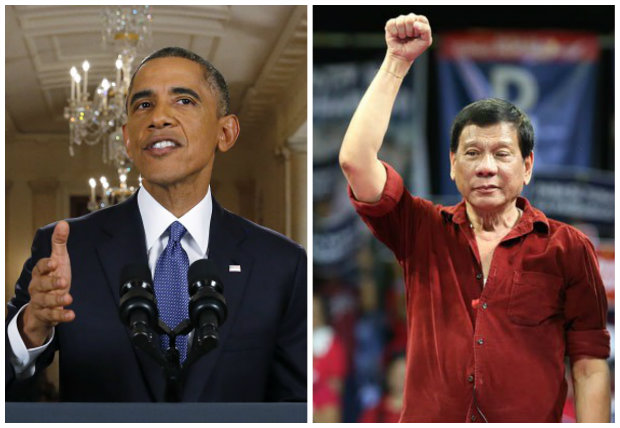Obama tells Duterte: Protect human rights

US President Barack Obama (left) has called up presumptive president-elect Rodrigo Duterte on Tuesday to congratulate him for his landslide win in the May 9 polling. AP FILE / INQUIRER FILE
WASHINGTON — President Barack Obama offered his congratulations Tuesday to the new presumptive president of the Philippines who has attracted controversy over his iron-fisted approach to law and order.
The White House said Obama and Rodrigo Duterte spoke by phone in their first conversation since Duterte declared victory in the May 9 vote.
Obama noted high voter turnout in the election was a sign of the Philippines’ “vibrant democracy,” and he highlighted the two nations’ “shared commitments to democracy, human rights, rule of law and inclusive economic growth,” a statement said.
Duterte has been a controversial character in Philippine politics. The longtime mayor of Davao City campaigned on a promise to end crime and corruption. His public threat to kill all criminals helped catapult him to the presidency but has alarmed human rights activists.
Deputy National Security Adviser Ben Rhodes acknowledged the controversy over some of Duerte’s past statements but he said the U.S. wanted to build on the “good progress” made between the allies under the outgoing administration of President Benigno Aquino III.
“For us, the priorities will remain the security and prosperity of the Philippines. We’ll want to see continued efforts in the Philippines in respect of rule of law and to combat corruption, just as we support those types of efforts across Asia and around the world,” Rhodes told the Center for a New American Security think tank.
“We believe that now as much as ever it’s important that the U.S. and the Philippines are seen as working together and also working with a network of allies and partners in Southeast Asia,” he said.
The historically tumultuous relationship between the U.S. and its former colony has thrived in recent years as the Philippines has turned to Washington for support against an assertive China with which the Philippines has territorial disputes in the South China Sea.
On Aquino’s watch, the Philippines has agreed to opening up several of its military facilities in American forces — a quarter-century after nationalist sentiments forced the closure of U.S. bases in the island nation.
Vigilante killings
Duterte has been criticized for allowing a spree of vigilante killings under his administration in Davao City, and critics fear he could let them happen on a larger scale as the country’s leader.
He has denied ordering any of the killings, but has not condemned them.
Washington has steered clear of the controversy, however, which analysts say reflects the reality of US national security interests given China’s increasingly assertive stance in Asia and maritime disputes in the South China Sea.
Duterte’s vows to restore law and order resonated with voters, but his incendiary rhetoric and advocacy of extrajudicial killings to stamp out crime and drugs have alarmed many people.
Dispute with China
Rhodes noted US support for Philippine efforts to resolve its territorial dispute with China in the South China Sea through international arbitration, and a recent deal allowing a greater US military presence in the country.
“We believe that now as much as ever it’s important that the US and Philippines are seen working together,” he said.
The US stance on Duterte could echo its approach toward India’s Prime Minister Narendra Modi. At one point, Modi was unable to obtain a US visa because of concerns about sectarian riots in the state of Gujarat when he was chief minister, but was later invited to the White House when he became prime minister.
Changing signals
The Philippines is one of Washington’s closest allies in Southeast Asia, but Duterte has indicated he may change tack.
He has said it is up to American officials to fix relations with him, after the US ambassador to Manila criticized his joke that he would have wanted to rape an Australian missionary who was killed in a 1989 Philippine prison riot.
Duterte has also indicated that he is prepared to hold direct talks with Beijing over a sensitive territorial dispute in the South China Sea, ignoring Washington’s support for Manila on the issue thus far.
In an interview with GMA TV news, Duterte said he told Obama that the alliance between the Philippines and the United States remained firm, especially on the issue of the West Philippine Sea.
“We will continue with our mutual interests,” Duterte said he told Obama.
But Duterte said he told the US leader that he might choose bilateral talks with China on their territorial dispute.
Duterte said Obama asked him to wait for the ruling of the international arbitration court before pursuing any other course to settle the dispute. With reports from the wires and Karlos Manlupig, Inquirer Mindanao
RELATED VIDEOS

